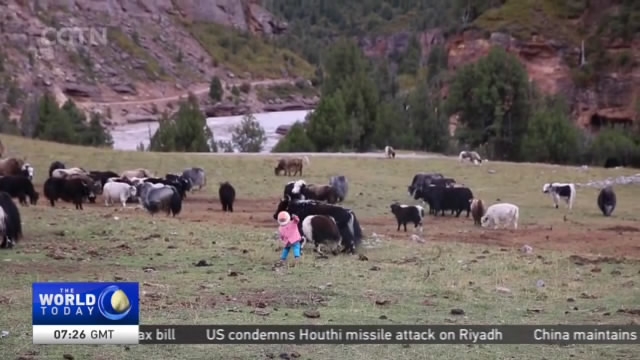
16:01, 20-Dec-2017
Human-Nature Conflict: Co-existing with wild animals on Qinghai-Tibet Plateau

Most agree that some ecological protection is essential for preserving planet Earth, but on China's Qinghai-Tibet Plateau, Tibetan nomads are finding there can be tough trade-offs for those protections. CGTN's Tao Yuan reports.
Five hours on bumpy mountain roads, the landscape keeping us occupied. We arrive in Zhahe Township, deep in the mountains on the Qinghai-Tibet Plateau. This is where China's weather is made, and where the country's battle against climate change unfolds. For generations, Tibetan nomads roamed this land, now the site of China's first national park. Ecological protections include a ban on all poaching. That may be good for the animals and the planet, but locals here say their safety is now threatened.
GESUND, CHIEF ZHAHE TOWNSHIP "Wild animals are increasing. We can see them, we can hear them. And there have been increasing conflicts between those wild animals and humans in the area."
Gesund takes me to the home of one herdsman. For the sixth time this year, this mud structure was attacked by a brown bear, while the owner was away herding his yaks. Household items smashed to the ground, windows and doors shattered. "There's little I can do," he says, "besides asking the government for some compensation." In the most extreme cases, lives are lost. Gesund shows me photos of a young man, who was killed during a morning encounter with a bear.
GESUND, CHIEF ZHAHE TOWNSHIP "Imagine how scared he must have been! On the other hand, bears don't usually attack humans. In this case, the bear must have been scared as well."
National parks are a manmade solution to manmade problems. But when human intervention disturbs a fragile balance, even a subtle change can mean painful adaptation. The Tibetan nomads are patient.
GESUND, CHIEF ZHAHE TOWNSHIP "We are attached to these animals. Some we revere. Even if we had a chance to avenge, we won't. We see this all as part of the wheel of life."
They've been part of this balance for centuries, and are determined to remain so. TY, CGTN, on the Qinghai-Tibet Plateau.

SITEMAP
Copyright © 2018 CGTN. Beijing ICP prepared NO.16065310-3
Copyright © 2018 CGTN. Beijing ICP prepared NO.16065310-3